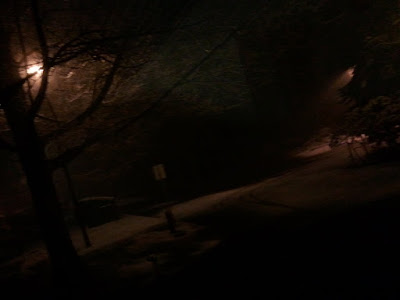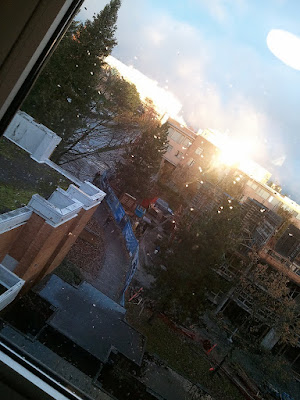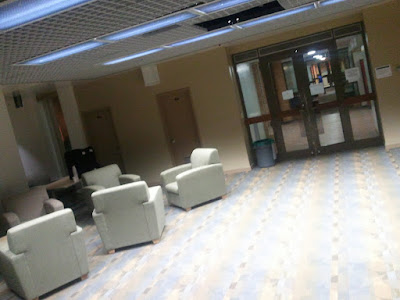(Fuck you eng phys/fizz is the name of a song about engineering physics at UBC, by a UBC engineering physics student.)
I think I've mentioned before that I'm looking into engineering physics. I'm not sure if I've mentioned what people keep telling me; "don't."
Engineering physics is basically applying the more complex ideas of physics such as electricity, quantum physics, optics, nuclear, or maybe even simple mechanics to engineering. It's technologically advanced, often deals with equations that would make you give up on math (it's suggested that eng phys students not take extra math courses, since they're physics calculations are more advanced) and require a super computer. It's a common joke (well, more like reality) that engineering physics students don't have lives, and it's a five year degree (whereas most degrees are four year programs). That's if you pass all your courses.
Well, a few days ago, I decided to do some exploring. I walked to the top of Henn, the physics and astronomy building, where there are many diagrams of physics concepts, pictures of galaxies (in various ranges of light), and some books and antiques on display. Then I walked across a hallway joining Henn to Hebb, where posters displayed a timeline of Principia, Newton's book that revoltionized mathematics and physics (including relolution). Then I reached Hebb, where there are intruments of physics that would make a cello feel small and insignificant. Up the stairs to the top floor, through the doorway where I noticed the video game poster, and up the blue stairs.
At the top was a room with event posters, thick books on low shelves, a complicated mechanical device of some kind, windows with a view over a large part of the campus (but it was a bad day for pictures), and sitting at a table, some engineering physics students, hard at work. I continued down a hallway of what looked like studying cubicles to another open room, this one with more tables, a few more students, vending machines (selling root^2 beer), and it's own cairn (the cairn is large, almost tetrahedral, concrete slab in the middle of UBC with E's written on each face as a display of the engineers' dominance). I eventually exchanged a few words with someone, telling them I was a first year looking into engineering physics. A couple of them looked around awkwardly for a moment before someone said what was on everybody (paying attention)'s mind: "Don't." I didn't argue, instead I headed back down and to class.
Since then, twice I've noticed posters advertising a branch of physics, and I've thought to myself, "that look cool, what is it." Both times, they were posters for engineering physics. Damn.
Monday, November 29, 2010
Definitions
Probably one of my best defined qualities is my use of definitions. I have a large catalog of words which hold very specific meanings to me, and which I use in very precise ways. You'll often hear me re-wording other people's sentences to make sure that we're using the same meaning*, or I'll define or ask for a definition of a word. This may seem odd, but it means a lot when your debates are as technical as some of the ones that I have. For example, I once had a debate about morals that ended before it started when we realized that I was using an objective scale (saying that there are no true universal morals), and my opponent was using a subjective scale (saying that there are societal accepted norms).
That is why, a few weeks ago, when someone told me that Christianity was not a religion, I had to re-work my entire vocabulary on the subject and even change my own personal stance.
As it happened, I was atheist, ex-catholic and strongly anti-clerical. I held, and still somewhat hold, a grudge against Catholicism, Christianity, and organized religion in in general.
Being told that Christianity wasn't a religion meant that I had the wrong idea about it, and had to re-define both religion and Christianity.
I spent the next few hours I had re-searching the subject. After several badly written websites on the subject, I came to an agreement that Christianity was not a religion, but a faith, a faith being a belief in (and including one's relationship with) deity. Religion, on the other hand, encompasses faith, but for an entire group of people and includes ideas such as morals, traditions, ceremonies, hierarchies, et cetera. So sure, Christianity isn't itself a religion, though I must add that there are many religions within Christianity (Catholic, Protestant, Mormon, et cetera).
Then I noticed something that annoyed me. Atheism was classified as a religion. It seemed like a contradiction in terms, but I found it to be true. Atheism has it's beliefs in the lack of a deity, and while there are no churches of it, it has many similar qualities to religion, including religious rights under law.
Realizing this lead to a personal dilemma. I disliked religion and didn't want to have any part in it. I quickly looked at my own beliefs: that I couldn't believe in any form of god I had ever hear presented. I had recently been thinking about pantheism and was using it in practice for a better definition of god**.
This motivated me to re-evaluate my position. Luckily, at the same time, I was working on a definition of science, because I had seen people debating whether science itself could be considered a belief system. So I focused on re-defining science.
After much rationalization, I decided that the main factor was that science was based on verifying through doubt, whereas religion was purely based on faith.
In other words, faith works by by finding a way to make sense of an observation based on ideals of god and the faith itself, and you can never disprove faith, though you can dis-verify it***.
In opposition, science works by coming up with theories and any time that the theory doesn't work, it is disproven. Also, a theory is always just a theory, there is no way to truly prove anything. I've also added to my definition that science requires the assumption that the universe can be modeled by theories, and that if somehow this is ever disproven, science as a whole must reject itself.
That last point is what I believe to be the most crucial point: it is possible to disprove science, but it is impossible to disprove faith. For this reason, I accept science, because faith does not allow for the possibility of being wrong.
It is important to get this point, science**** might not be right. Just because science says this today, doesn't mean that that's what science will say a hundred years from now, or even tomorrow. In fact, science might not even be right, science can be wrong, and we have to allow for that. Many people seem to take science as fact. It's not, it's just our best estimate. We're often wrong, and we might never get the right answers, but the scientific method is (at the very least, in my opinion) the best way we have of learning about our world.
This also means that nothing is absolutely knowable. There is no way to know anything absolutely. This means that the most scientific perspective might be agnosticism, but this is unappealing for two reasons. First, it's impractical to simply state that something is unknowable and leave it at that. We can still try, and most of us do. The second is that I'm not sure if god is knowable or not. I've found it hard even to simply define god. How many names, entities, personae, phenomena and ideals have been affixed to this "god" thing? I don't know what god is, I don't see why this idea of a higher being exists. There's no reason to ask the question "does go exist?" because we have no idea even what "god" is.
Hence, I've taken to ignosticism (which can be characterized my my latter two sentences). I don't see a point in asking whether god exists. Maybe someday there will be, but for now, I don't see any real reason to address it.
*For example, when someone has an idea that is along the same lines, but not exactly the same as my own, I'll say, "precisely," then correct myself and say, "well, actually I should say, 'accurately.'"
** Pantheism is the view that god is the all of the universe (as opposed to the supreme being outside the universe of most theisms). It worked well for me practically because I could use the term god in my vocabulary without a conflict. It's hard to blaspheme without some kind of "god."
*** For example, you can ask people to pray for something, and if it doesn't happen, then you can add one more point against the belief in god, but you can never entirely disprove god.
**** In this paragraph, I'm not talking about the scientific method, but the conclusion of science.
That is why, a few weeks ago, when someone told me that Christianity was not a religion, I had to re-work my entire vocabulary on the subject and even change my own personal stance.
As it happened, I was atheist, ex-catholic and strongly anti-clerical. I held, and still somewhat hold, a grudge against Catholicism, Christianity, and organized religion in in general.
Being told that Christianity wasn't a religion meant that I had the wrong idea about it, and had to re-define both religion and Christianity.
I spent the next few hours I had re-searching the subject. After several badly written websites on the subject, I came to an agreement that Christianity was not a religion, but a faith, a faith being a belief in (and including one's relationship with) deity. Religion, on the other hand, encompasses faith, but for an entire group of people and includes ideas such as morals, traditions, ceremonies, hierarchies, et cetera. So sure, Christianity isn't itself a religion, though I must add that there are many religions within Christianity (Catholic, Protestant, Mormon, et cetera).
Then I noticed something that annoyed me. Atheism was classified as a religion. It seemed like a contradiction in terms, but I found it to be true. Atheism has it's beliefs in the lack of a deity, and while there are no churches of it, it has many similar qualities to religion, including religious rights under law.
Realizing this lead to a personal dilemma. I disliked religion and didn't want to have any part in it. I quickly looked at my own beliefs: that I couldn't believe in any form of god I had ever hear presented. I had recently been thinking about pantheism and was using it in practice for a better definition of god**.
This motivated me to re-evaluate my position. Luckily, at the same time, I was working on a definition of science, because I had seen people debating whether science itself could be considered a belief system. So I focused on re-defining science.
After much rationalization, I decided that the main factor was that science was based on verifying through doubt, whereas religion was purely based on faith.
In other words, faith works by by finding a way to make sense of an observation based on ideals of god and the faith itself, and you can never disprove faith, though you can dis-verify it***.
In opposition, science works by coming up with theories and any time that the theory doesn't work, it is disproven. Also, a theory is always just a theory, there is no way to truly prove anything. I've also added to my definition that science requires the assumption that the universe can be modeled by theories, and that if somehow this is ever disproven, science as a whole must reject itself.
That last point is what I believe to be the most crucial point: it is possible to disprove science, but it is impossible to disprove faith. For this reason, I accept science, because faith does not allow for the possibility of being wrong.
It is important to get this point, science**** might not be right. Just because science says this today, doesn't mean that that's what science will say a hundred years from now, or even tomorrow. In fact, science might not even be right, science can be wrong, and we have to allow for that. Many people seem to take science as fact. It's not, it's just our best estimate. We're often wrong, and we might never get the right answers, but the scientific method is (at the very least, in my opinion) the best way we have of learning about our world.
This also means that nothing is absolutely knowable. There is no way to know anything absolutely. This means that the most scientific perspective might be agnosticism, but this is unappealing for two reasons. First, it's impractical to simply state that something is unknowable and leave it at that. We can still try, and most of us do. The second is that I'm not sure if god is knowable or not. I've found it hard even to simply define god. How many names, entities, personae, phenomena and ideals have been affixed to this "god" thing? I don't know what god is, I don't see why this idea of a higher being exists. There's no reason to ask the question "does go exist?" because we have no idea even what "god" is.
Hence, I've taken to ignosticism (which can be characterized my my latter two sentences). I don't see a point in asking whether god exists. Maybe someday there will be, but for now, I don't see any real reason to address it.
*For example, when someone has an idea that is along the same lines, but not exactly the same as my own, I'll say, "precisely," then correct myself and say, "well, actually I should say, 'accurately.'"
** Pantheism is the view that god is the all of the universe (as opposed to the supreme being outside the universe of most theisms). It worked well for me practically because I could use the term god in my vocabulary without a conflict. It's hard to blaspheme without some kind of "god."
*** For example, you can ask people to pray for something, and if it doesn't happen, then you can add one more point against the belief in god, but you can never entirely disprove god.
**** In this paragraph, I'm not talking about the scientific method, but the conclusion of science.
Saturday, November 20, 2010
First Snow
Some days ago, I was headed home after a late night of study and work. I just got outside when I noticed that the rain was falling too lightly and in drops too small. It was snow, or at least crystallized water. I don't see why else it would behave as such, but it would melt before even getting a chance to land.
Last night, after a long and hilarious series of plays, some friends and I were running through the rain to our residence. We made it in still dry and decided to meet back in the house lounge for some studying. I had just set up my laptop in the lounge when I walked back and saw Joël and his girlfriend standing outside. I opened the door for him and noticed that he was starring out at the night. It was snow, small specks of white on a black canvas of the night.
Then, this morning, I was walking along East Mall, headed North. It was a chilly morning, maybe even cold, the sort where you're expecting to see Jack Frost out and about his business. I was looking blankly at the mountains, as I often do, and getting close to my stop. Then I noticed what I was looking for, frost, snow, and winter. The mountains had been topped with a light blanket of white. It was framed beautifully over the garden with the flag pole in the foreground and the mountains flying low as if trying to hide in the snow.
 And now it's night and snowing outside. I've been in our house lounge looking out at it while chilling with some friends doing homework. They left a few minutes ago, just before it really started to come down.
And now it's night and snowing outside. I've been in our house lounge looking out at it while chilling with some friends doing homework. They left a few minutes ago, just before it really started to come down.
I took a few steps outside, encouraged by Joël who finds the stuff to be a lot of fun. I didn't have a jacket, but for me in temperatures like this, I'm fine. We threw a few snowballs, agreed to a snow fight (including his girlfriend) at some later date, drew in the snow, and then I headed back in to my studies, telling him to enjoy the snow. It's beautiful. I can see it in the light of the lamp posts and through the trees. A gentle, woolen, blanket. Every few minutes another person bursts through the doors exclaiming in amazement, "it's snowing!"
It's beautiful. I can see it in the light of the lamp posts and through the trees. A gentle, woolen, blanket. Every few minutes another person bursts through the doors exclaiming in amazement, "it's snowing!"
Last night, after a long and hilarious series of plays, some friends and I were running through the rain to our residence. We made it in still dry and decided to meet back in the house lounge for some studying. I had just set up my laptop in the lounge when I walked back and saw Joël and his girlfriend standing outside. I opened the door for him and noticed that he was starring out at the night. It was snow, small specks of white on a black canvas of the night.
Then, this morning, I was walking along East Mall, headed North. It was a chilly morning, maybe even cold, the sort where you're expecting to see Jack Frost out and about his business. I was looking blankly at the mountains, as I often do, and getting close to my stop. Then I noticed what I was looking for, frost, snow, and winter. The mountains had been topped with a light blanket of white. It was framed beautifully over the garden with the flag pole in the foreground and the mountains flying low as if trying to hide in the snow.
 And now it's night and snowing outside. I've been in our house lounge looking out at it while chilling with some friends doing homework. They left a few minutes ago, just before it really started to come down.
And now it's night and snowing outside. I've been in our house lounge looking out at it while chilling with some friends doing homework. They left a few minutes ago, just before it really started to come down.I took a few steps outside, encouraged by Joël who finds the stuff to be a lot of fun. I didn't have a jacket, but for me in temperatures like this, I'm fine. We threw a few snowballs, agreed to a snow fight (including his girlfriend) at some later date, drew in the snow, and then I headed back in to my studies, telling him to enjoy the snow.
 It's beautiful. I can see it in the light of the lamp posts and through the trees. A gentle, woolen, blanket. Every few minutes another person bursts through the doors exclaiming in amazement, "it's snowing!"
It's beautiful. I can see it in the light of the lamp posts and through the trees. A gentle, woolen, blanket. Every few minutes another person bursts through the doors exclaiming in amazement, "it's snowing!"
Tuesday, November 16, 2010
Beaming Sunlight
 This is what happens when you drop your cellphone. People take it and take silly picture of themselves drunk.
This is what happens when you drop your cellphone. People take it and take silly picture of themselves drunk. This is one of the few times that the picture is a beautiful as the real thing. Take that Dorian Grey.
This is one of the few times that the picture is a beautiful as the real thing. Take that Dorian Grey.
 Focusing on the rain drops on the window.
Focusing on the rain drops on the window.
Focusing on the view past the raindrops and the window.



 Where's the monkey? Seriously, this thing sneaks around our floor and is rarely found twice in the same place.
Where's the monkey? Seriously, this thing sneaks around our floor and is rarely found twice in the same place. This is why you don't bring engineering students to lunch, and why you DON'T GIVE THEM EXTRA GLASSES. They will incessantly build (rather stable) strange structures with them.
This is why you don't bring engineering students to lunch, and why you DON'T GIVE THEM EXTRA GLASSES. They will incessantly build (rather stable) strange structures with them. Sorry if you consider this distasteful. This is university: high on academics, freedom (including sexual) and many different organic compounds.
Sorry if you consider this distasteful. This is university: high on academics, freedom (including sexual) and many different organic compounds. Our main study lounge. The chairs are comfy, but their springs are very noisy.
Our main study lounge. The chairs are comfy, but their springs are very noisy.Re-define
A few days ago, a few phrases exchanged with a Christian forced me to redefine my entire vocabulary on the subject of faith. My opinions haven't been changed so much as they've been refined. I'd go into it, but I'm still working on it and I want to go over it with someone before I try to state my ideas.
In the same way, I'm noticing that I have to re-define this log. Originally it was to keep track of my experiences in Japan, to record the memories, and to let everyone know what I was up to without having to directly type a hundred e-mails.
When I returned to Canada, I kept it (barely) alive by using it to keep track of where I was personally, and to practice writing.
Now, I'm not sure what it should be. I was using it as a log of my life in residence, of my thoughts, experiences, life, and an explanation of it all. But now I know I'm not some main character. In Japan, it was myself and a few other 外人 (foreigners). Back on the east coast, it was me on my own. Now, it's me and a mixture of fifty-thousand students. Our stories are intertwined. I can't tell my story without theirs, but I'm not sure if their stories are mine to tell. That's why I have three entries typed up and ready to go, two of them have been posted and taken down, two extra are still up, and I'm not sure what to do. Even if I don't use names, it's still their story.
I'm also not sure who's reading this. It was originally just family and friends. Strangers are welcome, as this is the Internet, but they're of little consequence to someone who has given up on the concept of privacy. But now it's not just mine, and anyone here (at university) who ready this, while it's the same as all the gossip they'll hear, will have an insight into the lives of those around me. And even if I ask permission, how do I say "do you mind if I keep a public online record of my life, including the parts about you?" It seems a bit strange.
I'm not sure whether I'll get any replies to this*, and people usually just tell me to do what I feel like doing, but this time, I'm really not sure.
Pictures to follow.
Oh, and I'll be staying in Vancouver for the winter break.
*Replying is easy and does not require an account, just click on the "comment" link immediately below.
In the same way, I'm noticing that I have to re-define this log. Originally it was to keep track of my experiences in Japan, to record the memories, and to let everyone know what I was up to without having to directly type a hundred e-mails.
When I returned to Canada, I kept it (barely) alive by using it to keep track of where I was personally, and to practice writing.
Now, I'm not sure what it should be. I was using it as a log of my life in residence, of my thoughts, experiences, life, and an explanation of it all. But now I know I'm not some main character. In Japan, it was myself and a few other 外人 (foreigners). Back on the east coast, it was me on my own. Now, it's me and a mixture of fifty-thousand students. Our stories are intertwined. I can't tell my story without theirs, but I'm not sure if their stories are mine to tell. That's why I have three entries typed up and ready to go, two of them have been posted and taken down, two extra are still up, and I'm not sure what to do. Even if I don't use names, it's still their story.
I'm also not sure who's reading this. It was originally just family and friends. Strangers are welcome, as this is the Internet, but they're of little consequence to someone who has given up on the concept of privacy. But now it's not just mine, and anyone here (at university) who ready this, while it's the same as all the gossip they'll hear, will have an insight into the lives of those around me. And even if I ask permission, how do I say "do you mind if I keep a public online record of my life, including the parts about you?" It seems a bit strange.
I'm not sure whether I'll get any replies to this*, and people usually just tell me to do what I feel like doing, but this time, I'm really not sure.
Pictures to follow.
Oh, and I'll be staying in Vancouver for the winter break.
*Replying is easy and does not require an account, just click on the "comment" link immediately below.
Subscribe to:
Comments (Atom)

